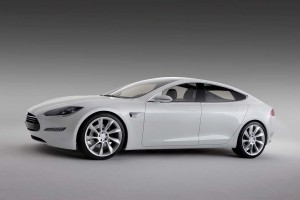The first new automotive IPO in a half-century was greeted by the sort of exuberance seldom seen on Wall Street, these days, as investors charged in to grab shares of the California electric-vehicle manufacturer, Tesla Motors.
Despite a last-minute move to raise the opening price of its stock to $17, while also substantially upping the number of shares being offered, investors plugged in and were clearly turned on. By the time the first day of trading ended, Tesla had jumped 40.5%, to $23.89. And the upward momentum is continuing. By midday Wednesday, shares had nudged past $28, another 20% gain.
The initial public offering netted Tesla $226.1 million for 13.3 million shares. The company had originally planned to put 11.1 million shares on the market – representing 12% of its equity – at a price range of $14 to $16. (Click Here for more.) The news is particularly good for Tesla founder Elon Musk, who has invested a large chunk of his personal fortune, derived from his stake in the online financial service PayPal. In recent weeks, Musk, who is going through a bitter divorce, let it be known that he is now broke.
(Click Here for more on Musk’s personal financial travails.)
The market’s solid response to Tesla reflects the growing interest and optimism about battery-electric vehicles, such as the Tesla Roadster and the company’s Model S, a 7-seat battery sedan promised to reach market around 2012.
But that also downplays some numerous risks. For one thing, Tesla has yet to report a quarterly profit during its admittedly brief history. Total losses have come to $230.5 million, while the most recent quarter saw the year-over-year deficit nearly double, to $29.5 million.
Between now and the launch of the Model S, Tesla will be ramping down production of the Roadster, but hopes to generate at least some revenue from partnerships with, among others, Daimler AG and Toyota. The German maker is using Tesla technology in the new Smart electric and other vehicles. Toyota, meanwhile, is investing $50 million in Tesla and may also work with the California-based firm on future battery car programs.
Spearheaded by the South African-born Musk, Tesla has positioned itself as one of the leaders in the nascent electric vehicle market, but it is facing a growing number of competitors, such as Zap, another California battery car producer, and Fisker Automotive, which is readying a series of plug-in hybrid-electric vehicles.
There’s a strong debate underway in the auto industry over which is the best approach to electrify the automobile: by going to pure battery power or with advanced hybrids, like the Fisker Karma and the Chevrolet Volt, the latter model promising to provide enough range on lithium-ion power for a typical daily commute. For longer drives, Volt’s gas engine would fire up. That overcomes what industry analysts describe as “range anxiety.”
The fact that major makers like GM, Toyota, Ford and Volkswagen are also entering the battery car field puts Tesla in a sort of David v Goliath situation; though it hopes partnering opportunities will get it through the crunch. Apparently, investors are buying that argument.
Tesla’s stock offering marks the first U.S. automotive IPO since the Ford family staged their own IPO for their eponymous company in 1956.

